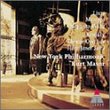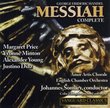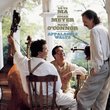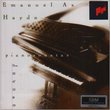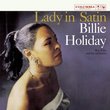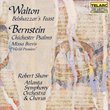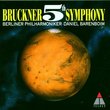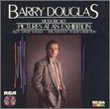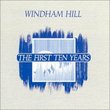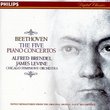| All Artists: George Frideric Handel, John Eliot Gardiner, Margaret Marshall, Anthony Rolfe Johnson, The Monteverdi Choir, The English Baroque Soloists, Saul Quirke, Catherine Robbin, Charles Brett, Robert Hale Title: Handel - Messiah / M. Marshall · Quirke · Robbin · Brett · Rolfe Johnson · Hale · The Monteverdi Choir · The English Baroque Soloists · Gardiner Members Wishing: 0 Total Copies: 0 Label: Polygram Records Release Date: 10/25/1990 Genres: Special Interest, Classical Styles: Holiday & Wedding, Opera & Classical Vocal, Historical Periods, Baroque (c.1600-1750) Number of Discs: 3 SwapaCD Credits: 3 UPC: 028941104120 |
Search - George Frideric Handel, John Eliot Gardiner, Margaret Marshall :: Handel - Messiah / M. Marshall · Quirke · Robbin · Brett · Rolfe Johnson · Hale · The Monteverdi Choir · The English Baroque Soloists · Gardiner
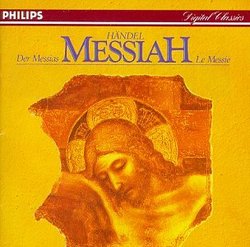 | George Frideric Handel, John Eliot Gardiner, Margaret Marshall Handel - Messiah / M. Marshall · Quirke · Robbin · Brett · Rolfe Johnson · Hale · The Monteverdi Choir · The English Baroque Soloists · Gardiner Genres: Special Interest, Classical
John Eliot Gardiner's is a highly musical and inspired account of Messiah, featuring an excellent group of soloists and an outstanding period-instrument band. With dance rhythms athletically sprung and da capo arias tastef... more » |
Larger Image |
CD DetailsSynopsis
Amazon.com John Eliot Gardiner's is a highly musical and inspired account of Messiah, featuring an excellent group of soloists and an outstanding period-instrument band. With dance rhythms athletically sprung and da capo arias tastefully ornamented, the performance generates consistent interest and is lively in spite of its length. There is splendid choral singing from the Monteverdi Choir--the ending of "All We Like Sheep" is quite potent--and much wonderful work from the soloists. The recording, made in 1982, is impeccable. --Ted Libbey Similar CDs
Similarly Requested CDs
|
CD ReviewsTHE Messiah David Wihowski | Milwaukee, WI USA | 05/18/2000 (5 out of 5 stars) "I have been in love with Messiah since I was 12 years old. My first (and second) recordings were made by an orchestra of 100+ and a chorus of 200+. The tempos were sluggish, the counterpoint was mud, but the glory of Handel's genius still grabbed me.When I finally heard the Gardiner recording I wept from the clarity, power and spirituality that grabbed my heart anew. This is now my definitive Messiah recording. The reviewer who thought Gardiner was eccentric, possibly is in love with his older, slower, bigger, grander Messiahs. I cannot say those recordings are terrible for they taught me to love Handel. I just believe that Gardiner really got it right (the way Handel wanted it). I personally find Hogwood tedious and wooden.Period performance usually does take some time to get accustomed to. Don't start with the Messiah as your first period performance recording. Begin with some other Handel oratorios (Judas Maccabeas, Occaisional Oratorio), Bach cantatas, or baroque operas to get used to the sound and the style. Then go back to Messiah once you ear is used to the period style/sound.I recommend the Gardiner version above all other period performances, though there are other great ones. Gardiner's phrasing, shading, dynamics, balance and tempos hit the mark for me. Gardiner's Messiah lives every time I listen to it.(P.S. The "eccentric" reviewer's comment about boy sopranos is not likely true, Handel did use female (choral) sopranos, at least with some frequency; and his soprano soloists were probably always women.)" One of The Best Overall Versions Available Fred Chung | San Francisco, CA | 05/19/2000 (5 out of 5 stars) "The Messiah is such a multifaceted ensemble work that I think it's almost impossible to find the "perfect" recording. I've found something I like and something I dislike in pretty much every version I've ever come across, and I've found that not even my favorite version (this one) can keep me interested all the time: sometimes I'm in the mood for the "period-instruments" approach, but sometimes I really have a hankering for the full-blooded Georg Solti chorus and modern orchestra.Having said all that, this is a great recording! The pluses are many and the minuses are few. As with most period-instrument recordings, the tempos are quick and the orchestra sound is clear and bright -- everything moves along at a brisk pace. Unlike many other period-instrument recordings, however, it never sounds too light or insubstantial -- Gardiner strikes an amazingly ideal balance between freshness and grandeur. The virtuosity of the Monteverdi Choir is breathtaking -- they sing the fast parts real fast -- and the soloists are not only technically accomplished, but they also sing with real feeling, especially Margaret Marshall, who is outstanding in both "Rejoice Greatly" and "I Know That My Redeemer Liveth."What are the minuses? Well, there are a few idiosyncratic tempo and dynamic decisions -- most notably, the "Hallelujah" chorus starts softly and then crescendos to the end. But these are far less irritating than the many, many idiosyncrasies that exist in other versions (such as in the grossly overrated McCreesh recording on the Archiv label). No, the biggest drawback about this version is the cost -- they could easily have fit all the music onto two CDs, as it takes up less than 140 minutes total, but instead they decided to spread it out over three full-priced CD's. Ouch.Notwithstanding the high price, if you're only going to get one version of the Messiah, I agree with those folks who say that this is the one to get. If you're going to get a few versions, you might also want to try the mid-price Colin Davis version and/or the still-full-price(?) Solti. The one to avoid, as mentioned above, is the recent McCreesh recording, which inexplicably has received critical raves, even though the sound quality is not good (the chorus sounds like they're singing in a cave), the soloists are boring (except Dorothea Roschmann), and worst of all, there are many questionable decisions by McCreesh on tempos and dynamics." Clarity of line and transparency of sound with a likving pur Craig Matteson | Ann Arbor, MI | 07/05/2002 (5 out of 5 stars) "This recording of this wonderful work has many virtues. It is a small ensemble with skilled singers and a very gifted conductor. Remember this is contrapuntal music with many simultaneous lines - not just a melody with harmony.
Gardiner lets us hear everything and it is wonderful. He also makes everything we here a choice. It is all on purpose. That doesn't mean deliberate or frozen. Heavens no! This piece is alive and every note is going somewhere for a reason. There are surprising interpretations as well. Sharp stacattos, dramatic pauses, strong contrasts. If we take just "Worthy is the Lamb" and the final "Amen" fugue as a case, we note that he comes in strong on the first statement of "Worthy is the Lamb that was slain!". But on the second repeat, it is more of a marvellous contemplation. And the Amen begins very soft as if the chorus is part of the beatific vision and builds. After the first orchestral interlude the chorus comes in strong, but the tempo never picks up. It is rather slow throughout. That allows for a more massive feeling as things seem to mount to the infinite. It may not be my personal preference, but I certainly admire and respect Gardiner for showing me another approach and convincing me of its power and worth. While this version lets the music carry the drama rather than letting the singers emote as if this were a romantic era opera, there is plenty of emotion and range in this recording. The ornamentation is tastefully done and does add to the expessivenes of the work. "The Trumpet Shall Sound" sounds terrific. Sometimes the natural trumpet can be played out of tune, but Crispian Steele-Perkins nails it. The "Hallelujia Chorus" is actually sung rather than roared and that is nice change. Don't get me wrong, there is plenty of energy and power, but it is full volume all the way through. And every word can be understood. Just imagine if we had heard it this clearly from our childhood and we could have avoided all those misunderstanding of what was being sung! This is a recording I am very happy to own and it is music making I am grateful to be able to hear again and again. This is wonderful stuff!" |

 Track Listings (12) - Disc #1
Track Listings (12) - Disc #1

